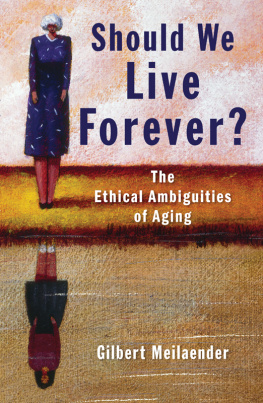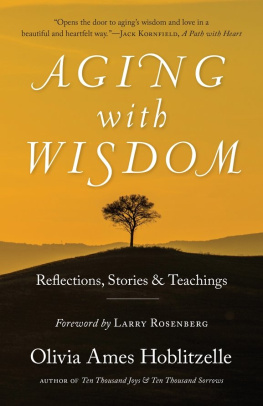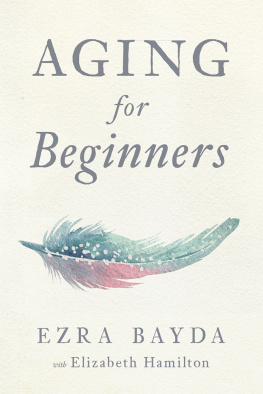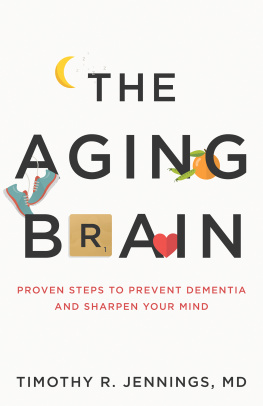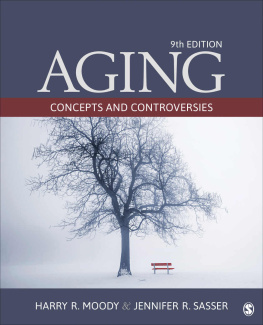Marc E. Agronin M.D - The end of old age: living a longer, more purposeful life
Here you can read online Marc E. Agronin M.D - The end of old age: living a longer, more purposeful life full text of the book (entire story) in english for free. Download pdf and epub, get meaning, cover and reviews about this ebook. City: New York;NY, year: 2018, publisher: Da Capo Press, genre: Home and family. Description of the work, (preface) as well as reviews are available. Best literature library LitArk.com created for fans of good reading and offers a wide selection of genres:
Romance novel
Science fiction
Adventure
Detective
Science
History
Home and family
Prose
Art
Politics
Computer
Non-fiction
Religion
Business
Children
Humor
Choose a favorite category and find really read worthwhile books. Enjoy immersion in the world of imagination, feel the emotions of the characters or learn something new for yourself, make an fascinating discovery.

- Book:The end of old age: living a longer, more purposeful life
- Author:
- Publisher:Da Capo Press
- Genre:
- Year:2018
- City:New York;NY
- Rating:3 / 5
- Favourites:Add to favourites
- Your mark:
- 60
- 1
- 2
- 3
- 4
- 5
The end of old age: living a longer, more purposeful life: summary, description and annotation
We offer to read an annotation, description, summary or preface (depends on what the author of the book "The end of old age: living a longer, more purposeful life" wrote himself). If you haven't found the necessary information about the book — write in the comments, we will try to find it.
The end of old age: living a longer, more purposeful life — read online for free the complete book (whole text) full work
Below is the text of the book, divided by pages. System saving the place of the last page read, allows you to conveniently read the book "The end of old age: living a longer, more purposeful life" online for free, without having to search again every time where you left off. Put a bookmark, and you can go to the page where you finished reading at any time.
Font size:
Interval:
Bookmark:
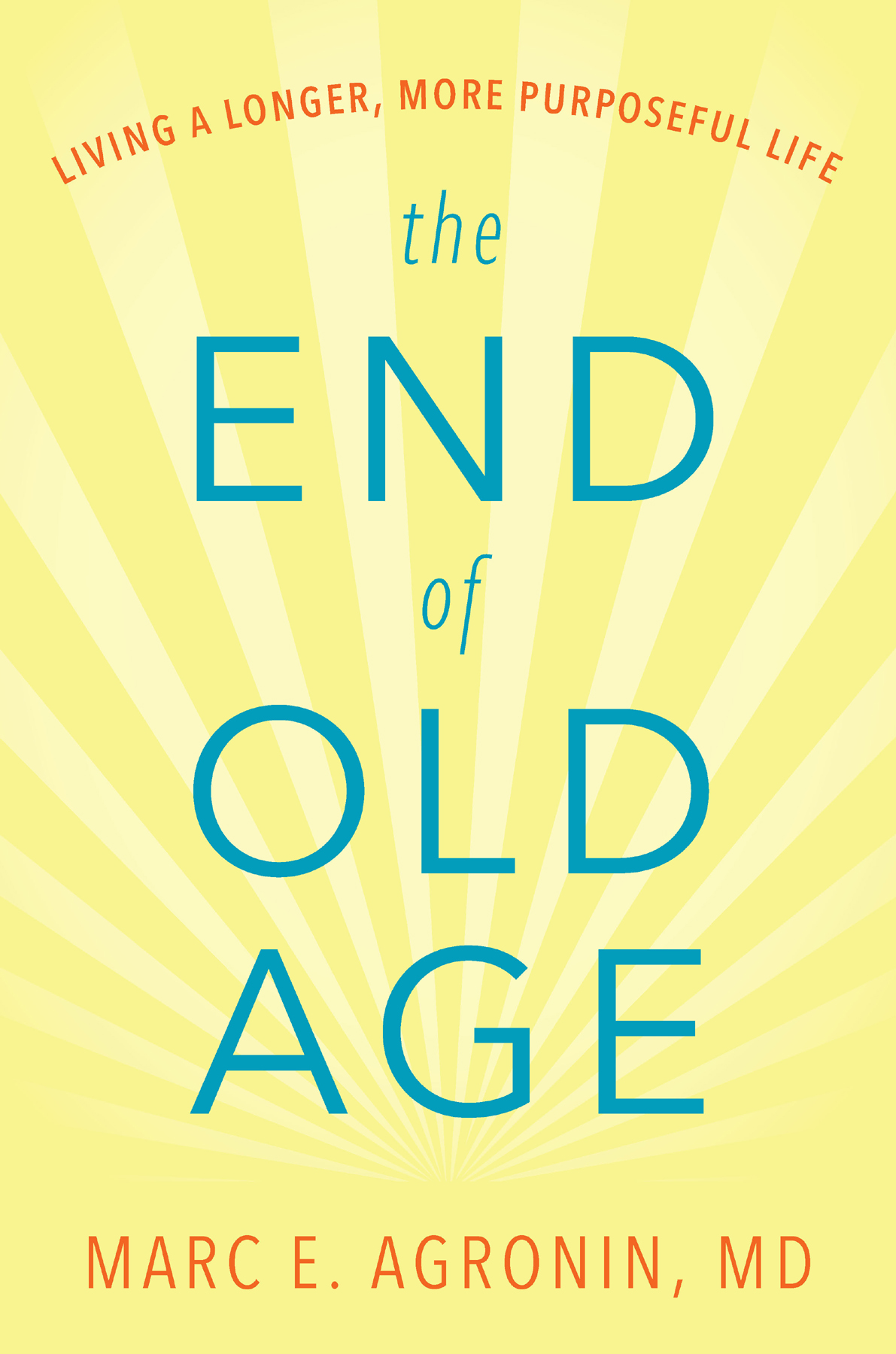
Copyright 2018 by Marc E. Agronin
Hachette Book Group supports the right to free expression and the value of copyright. The purpose of copyright is to encourage writers and artists to produce the creative works that enrich our culture.
The scanning, uploading, and distribution of this book without permission is a theft of the authors intellectual property. If you would like permission to use material from the book (other than for review purposes), please contact permissions@hbgusa.com. Thank you for your support of the authors rights.
Da Capo Press
Hachette Book Group
1290 Avenue of the Americas, New York, NY 10104
www.dacapopress.com
@DaCapoPress; @DaCapoPR
First Edition: January 2018
Published by Da Capo Lifelong Books, an imprint of Perseus Books, LLC, a subsidiary of Hachette Book Group, Inc. The Da Capo Lifelong Books name and logo is a trademark of the Hachette Book Group.
The Hachette Speakers Bureau provides a wide range of authors for speaking events. To find out more, go to www.hachettespeakersbureau.com or call (866) 376-6591.
The publisher is not responsible for websites (or their content) that are not owned by the publisher.
Library of Congress Cataloging-in-Publication Data
Names: Agronin, Marc E., author.
Title: The end of old age : living a longer, more purposeful life / Marc E. Agronin.
Description: First edition. | New York, NY : Da Capo, 2018 | Includes bibliographical references.
Identifiers: LCCN 2017037867| ISBN 9780738219981 (hardcover) | ISBN9780738219998 (ebook)
Subjects: | MESH: Aging | Aged | Quality of Life | Health Knowledge, Attitudes, Practice | Popular Works
Classification: LCC QP86 | NLM WT 120 | DDC 612.6/7dc23
LC record available at https://lccn.loc.gov/2017037867
ISBNs: 978-0-7382-1998-1 (hardcover); 978-0-7382-1999-8 (ebook)
E3-20171205-JV-PC
Even if I could have done, when I was young, what I am doing nowI wouldnt have dared.
HENRI MATISSE
T HIS BOOK HAS a simple message: aging brings strength. When we realize the truth of this message, we can begin to end the tired and constricted notions of old that we internalize throughout our lifetime and that serve to denigrate and limit our aging self and perpetuate an ageist culture. To achieve this understanding, we must recognize the immense potential of our aging self, even in the face of common and expected struggles. We must learn how to age in a creative manner that is both the antidote to feeling old and the elixir of aging well.
In writing this book, however, I have been confronted with the absence of certain terms to capture many of the ideas and themes to support this message. There is a whole language to talk about growth and development from childhood to adulthood, but for old age we find an undefined plain that is further obscured by pejorative labels. I have found it necessary, then, to redefine several key terms and create new ones about aging, to advance my arguments. I am not so bold as to suggest that these terms could or should be part of a larger discussion beyond the confines of this book, but I do welcome a new way of talking about aging that will echo and support these positive points.
Most of the individuals whom I interviewed and feature throughout the book gave me permission to use their actual names, and were eager to share their life histories with me and with readers. In several circumstances, I have changed the name or other identifying biographical details so as to preserve anonymity, especially for individuals who passed away long before I began writing their stories. My goal is to learn about aging from each of these generous individuals, and to both share and celebrate in these pages all the wisdom they have gained throughout their lives.
The seeds of this book began on a shaded porch just outside Washington, DC, in late summer of 2010, when I had the distinct life-changing honor to spend a few hours with Dr. Gene Cohen to talk about the aging process. Unbeknownst to me at the time, this visionary was in the last few months of his life, and yet he took the time to impart his knowledge and guide my thinking despite the underlying pain and worry that he was facing. The young doctor who walked onto that porch was not the same person who left a few hours later, and I am dedicating this book to Genes memory in the humble hope that I may continue his legacy and join the ongoing work of his life partner, Wendy Miller, to understand and promote creative aging.
M OST OF US envision living a very long life, and we wonder and scheme how to get there. Now imagine if I told you that I had discovered several potential secrets to achieve this, and I laid them before you on three covered silver trays. You uncover the first and discover a small glass bottle containing genuine water from the fabled Fountain of Youth. You uncover the second tray and discover a pill bottle with a brightly colored label touting a formula designed to add years to your life. Finally, you lift the cover off the third tray and discover, to your surprise, two cigarettes, a glass of red port wine, and several French chocolates.
Which would you choose? You might be bemused by the water and tempted to take a sip, but you realize, no doubt, that it is a gimmick and nothing more. The mysterious supplement in the pill bottle may be bolstered by fantastic claims on its label, but there is no solid proof of its power, and any potential benefit is only a guess. And then there is the strangest choice of allthe smokes, the drink, and the candy. If you choose to indulge in one or more of these treats, you may be guaranteed some brief pleasuresbut long life? It seems unlikely. But there is, of course, a story behind this last choice.
Perhaps you have heard of a French woman by the name of Jeanne Louise Calment, the oldest person in recorded human history, who died in 1997 at the age of 122 years and 164 days. As a young girl, she watched the Eiffel Tower being built and later recalled the likes of a rather scruffy and unpleasant artist by the name of Vincent van Gogh who used to frequent her fathers fabric store. When she was ninety years old, an enterprising forty-seven-year-old lawyer made an agreement with Madame Calment to pay her a monthly stipend in exchange for her property upon her passing. Unbeknownst to poor Mr. Raffray, however, he would be making payments to this supercentenarian for the next thirty years, up until his own death, after which his widow continued their financial obligation for another two years. When asked about her secret to such a long life, Madame Calment pointed to her lifestyle: she loved regular servings of port wine and chocolate, was physically active but not an exercise fanatic, and smoked two cigarettes daily up to the age of 117. Her longevity strategy, planned or not, certainly seems both unreliable and idiosyncratic, but it is not unlike similarly strange secrets of other supercentenarians.
For example, there was the remarkable Dutch lady Hendrikje van Andel-Schipper. At the age of 112, Hendrikje underwent extensive cognitive testing and scored above average for someone forty years her junior. Her mental clarity remained extraordinary up until the day of her death four years later. An autopsy of her brain revealed few of the telltale pathological signs of similarly aged brains, such as narrowed, sclerotic blood vessels, or plaques containing the toxic amyloid protein associated with Alzheimers disease. Predictably, Hendrikje was neither teetotaler nor triathlete, and engaged in none of the popular antiaging strategies, such as a vegan diet, caloric restriction, vigorous exercise, or any other youth-restoring pill, potion, or plan. When asked about her secret to a long life, Hendrikjemuch like our friend Madame Calmentrevealed a simple and surprising routine: a daily dose of raw herring and a glass of orange juice. The oldest Japanese person ever117-year-old Misao Okawaattributed her longevity to sushi and sleep. The Italian 116-year-old Emma Morano cited raw eggs and brandy as her secret formula, whereas the American 116-year-old Susannah Mushatt Jones eschewed alcohol and cigarettes but included at least four strips of bacon in her daily diet.
Font size:
Interval:
Bookmark:
Similar books «The end of old age: living a longer, more purposeful life»
Look at similar books to The end of old age: living a longer, more purposeful life. We have selected literature similar in name and meaning in the hope of providing readers with more options to find new, interesting, not yet read works.
Discussion, reviews of the book The end of old age: living a longer, more purposeful life and just readers' own opinions. Leave your comments, write what you think about the work, its meaning or the main characters. Specify what exactly you liked and what you didn't like, and why you think so.

